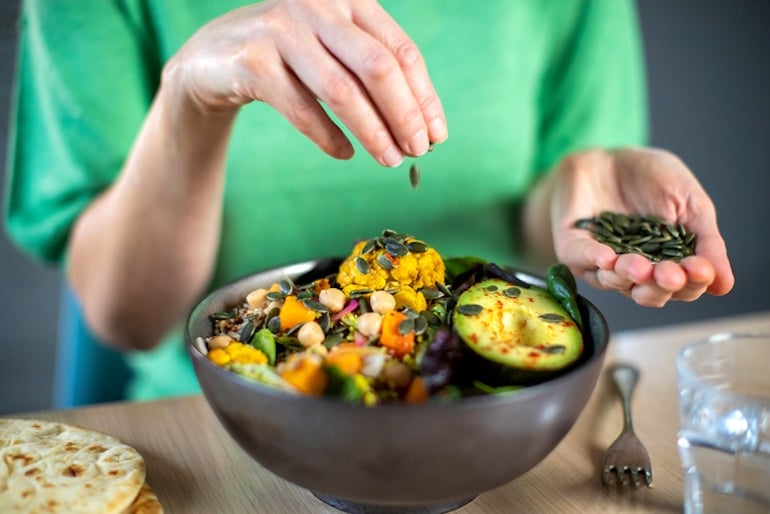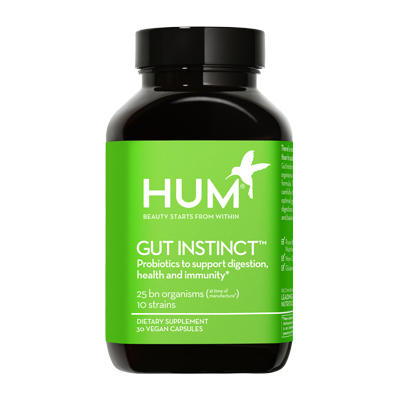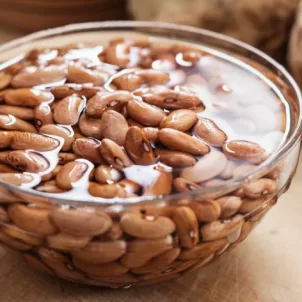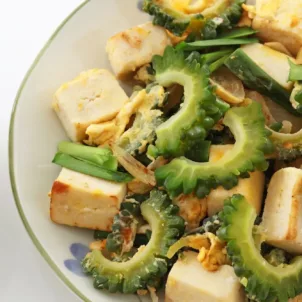Carrie Gabriel, MS, RDN, explains what bio-individuality is and why learning more about your own is essential for lasting health and wellness.
For decades, we’ve been bombarded with processed foods, misinformation, and marketing from food giants. It seems we’ve lost touch with what our bodies need and what feeling good is actually like.
However, the best source for knowing what truly works for your body and health is your own self. When you listen to your own internal cues, you’re accessing your bio-individuality.



What is bio-individuality?
Bio-individuality is the idea that there’s no one-size-fits-all approach to health and nutrition. Instead, we’re all unique in our biological makeup and requirements. Each person has their own specific nutritive and health needs, as well as routines, practices, and preferences that work for them. For example, the foods that sustain me throughout the day, the exercises that work for my body, and the coping mechanisms that help me fight stress will likely vary from those that work for you. In short, our bodies react differently to various foods, habits, and the like. The same idea extends to countless aspects of our lives. The way we respond to and act through daily life makes our journeys on this planet even more unique and individual to us. So how can we expect to live our lives well by following the same rules, paths, and expectations of others? We can’t—and that’s where bio-individuality comes into play.
What Research Says About Bio-Individuality
Differences in gut health, glucose intolerance, and more appear to play a role in how each of us reacts to certain foods. A 2015 study tracked the blood sugar levels of 800 people for over a week. Researchers collected data through health questionnaires, body measurements, blood tests, glucose monitoring, stool samples, and a mobile app to report lifestyle and food intake. Volunteers also received a few standardized/identical meals for breakfast. The study concluded that age and body mass index (BMI) are associated with blood glucose levels after meals. However, the data also revealed that different people show different responses to the same food, even though their individual responses didn’t change from one day to another. This finding suggests that each person metabolized these meals differently, and that tailoring nutrition on a bio-individual level would aid in furthering their health goals.What factors influence bio-individuality?
A number of factors influence your bio-individual profile. Here are some that can have the biggest impact.genetics
Studies show that your genetic background has a lot to do with your optimal diet and lifestyle prescription. For instance, if your ancestors are from East Asia, you’re more likely to thrive on a diet high in rice, sea vegetables, and fish. Next, if your ancestors are from South Asia, your digestive system will probably love basmati rice, cooked beans, and curry. On the other hand, someone from Northern Europe might thrive on high-quality dairy. This theory also applies to foods that you have trouble digesting. For example, if dairy wasn’t part of your ancestors’ diets, there’s a good chance that’s why you may also have difficulty tolerating it.
Blood Type
Each blood type (A, B, AB, O) can be traced to a certain period of human history with distinct differences in diet, culture, and social conditions. Additionally, each blood type has particular strengths and limitations. Knowing more about them can help you uncover insights and make better choices when it comes to biochemical individuality and nutrition. For example, many type O’s feel energized by eating meat. Meanwhile, type B’s are better able to digest dairy. Some people believe that if you eat a food that’s incompatible with your blood type, it could eventually lead to health problems. However, more research is needed to make definitive claims about this factor of bio-individuality.gut health
Research claims there are several factors associated with the variation in the community and structure of the gut microbiome. These include:- age
- environmental exposures
- health status
- genetics
- socioeconomic status
- geography
- pregnancy
- exercise
- antibiotic intake
metabolism
Metabolism—the rate at which you convert food into energy—is another major aspect of bio-individuality. Knowing this can be helpful when gauging the amount of food your digestive system can process. One theory from nutrition researcher William Wolcott suggests that we fall under one of three metabolic types:- protein type
- carbo type
- mixed type

How to Honor Your bio-individuality
As an individual seeking optimal health, it’s up to you to discover what diet and lifestyle suits you best. While it may take some extra time and effort, it’ll be worth it in the long run. Here are some tips to follow your very own bio-individuality diet.Identify Personal Food Sensitivities
To start, you can clean up your diet from scratch. Consider removing processed foods from your diet and eating only real, whole foods for two to three weeks to give your body a clean slate to work with. One by one, you can add other foods back in to help you figure out any food sensitivities.Monitor Your Macronutrient Intake
Next, you can play around with your macronutrients (fat, protein, carbohydrates) and adjust your ratios accordingly. You may want to keep a food journal to record how you feel after eating. For instance, if you’re still hungry an hour after your meal, perhaps you didn’t eat enough fat or protein. Otherwise, if you’re exhausted after your meal, you may need to lower your carbohydrate intake.Investigate Your Ancestry
It could also be helpful to look into your ancestors’ diets. Since you inherit your genetic makeup from them, it’s likely that you’d thrive on foods that were integral to their diets.The Bottom Line
In sum, the crux of bio-individuality indicates that knowledge is power when it comes to your body. The more you know yourself physically, the clearer you’ll become mentally and the better you’ll feel emotionally. And while personal exploration into your unique needs is a great starting point, enlisting the help of a registered dietitian or medical professional can help you go the extra mile.More like this









